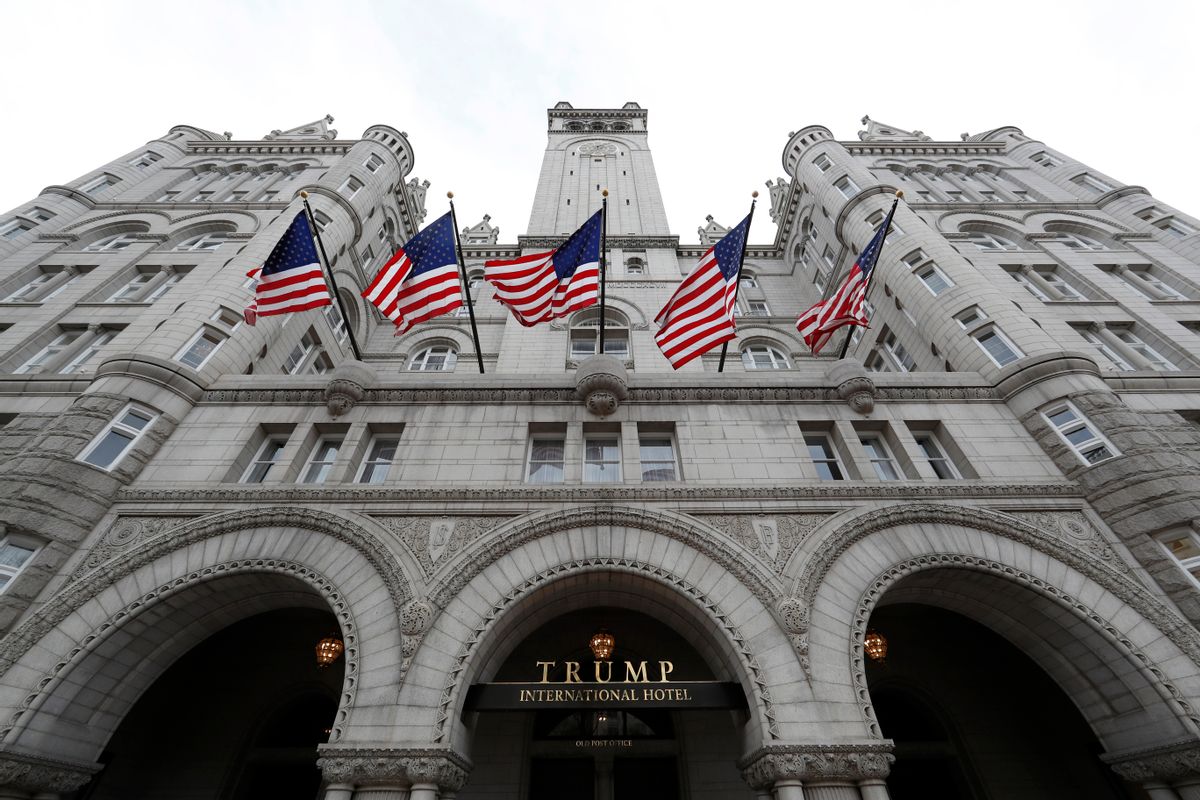In a detailed new report Wednesday, journalists David Fahrenthold and Jonathan O'Connell at the Washington Post showed how the Saudi regime used a veterans group to dump hundreds of thousands of dollars into President Donald Trump's business — an incident that has become emblematic of the Emoluments Clause case against the president.
The Constitution's Emoluments Clause bars the president and other officials from receiving payments from foreign governments while in office. Attorneys general from Washington D.C. and Maryland are currently bringing a case against the president because his continued control of his business empire has allowed him to receive such payments.
And the Saudis, it seems, have been big customers. The Post reported that lobbyists for Saudi Arabia spent $270,000 at Trump International Hotel in D.C. shortly after Trump's election in 2016. It also found that the regime is finding other avenues to pay Trump money:
Since February 2017, Saudi customers have boosted the bottom line at two other Trump hotels. In Chicago, the Trump hotel’s internal statistics showed a sharp uptick in customers from Saudi Arabia after Trump took office. In New York this year, the general manager of Trump’s hotel at Central Park said a single stay by some Saudi customers — who were traveling with Crown Prince Muhammad bin Salman — was so lucrative, it helped the hotel turn a profit for the quarter.
But the D.C. case is particularly galling because of the way it used veterans.
Fahrenthold and O'Connell report that the lobbying firm Qorvis/MSLGroup, working for the Saudis, paid for groups of veterans to have lavish stays at Trump's hotel while lobbying lawmakers against legislation the reigme opposed. But many of the veterans said they didn't realize the Saudi regime was paying for the trip or that they only found out later, leaving them feeling "duped."
Michael Gibson, who helped organize the trips, insisted that the veterans were informed of the funding source and that the aim was not to win favorable treatment from the president by paying his businesses.
However, Henry Garcia, a Navy Veteran who took the trip, told the Post that once he found out the regime was behind the event, he said to himself, "Oh, we were just used to give Trump money.”
Perhaps most damning of all about the report is that the veterans weren't even provided with sufficient training to be good lobbyists. If the operation wasn't aiming to actually influence law, it seems more likely that it was used to directly influence the president.
All of this is especially damning because of Trump's behavior toward Saudi Arabia. He has consistently touted the regime as a central ally, even though this claim is dubious, and the administration has supported the ongoing war and human rights catastrophe in Yemen. Most recently, the administration has been helping to cover up the evidence of Saudi Crown Prince Mohammed bin Salman's involvement in the assassination of Washington Post journalist Jamal Khashoggi.
After receiving criticism for his shady ties to the country, the president said on Nov. 20, "I have no business whatsoever with Saudi Arabia."
Even the mere appearance of foreign corruption, putting aside the frightful amount of evidence of corruption, should be reason enough for the president to be blocked from receiving these funds. It's intolerable to think the country's foreign policy might be driven by Trump's private greed.




Shares